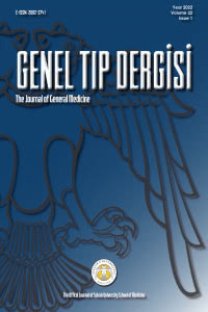Enteral beta glukanın ratlarda oluşturulan deneysel kısa barsak modelinde intestinal adaptasyon üzerindeki etkisi
Effects of enteral beta glucan in a rat model of short bowel on intestinal adaptation
___
- 1. Levine GM: Short gut syndrome and intestinal adaptation. In Kurt RC (ed): Nutrition in Gastrointestinal Disease. Churcill Livingtsone, 1981, pp 101-11.
- 2. Welters CF, Dejong CH, Deutz NE, Heineman E. Intestinal function and metabolism in the early adaptive phase after massive small bowel resection in the rat. J Pediatr Surg 2001;36:1746-51.
- 3. Scolapio JS. Tales from the crypt. Gastroenterology 2003;124:561-4.
- 4. Deitel M. Wong KH: Short bowel syndrome. In Deitel M (ed): Nutrition in Clinical, Baltimore, Williams and Wilkins. 1980, pp 189-208.
- 5. Dudrick SJ, O’Donnel JJ, Englert DM: Ambulatory home parenteral nutrition for short bowel syndrome and other diseases. In Deitel M (ed): Nutrition in Clinical Surgery. Baltimore, William & Wilkins. 1985, pp 276-87.
- 6. Tsukada C, Yokoyama H, Miyaji C, Ishimoto Y, Kawanamura H, Abo T.. Immunopotention of intraepithelial lymphocytes in the intestine by oral administrations of beta glucan. Cell Immun 2003;221:1-5.
- 7. Bedirli A, Gokahmetoğlu S, Sakrak O, Ersoz N, Ayangil D, Esin H. Prevention of intraperitoneal adhesion formation using beta glucan after ileocolic anastomosis in rat bacterial peritonitis model. Am J Surg 2003;185:339-43.
- 8. William D, Sherwood ER, Browder LW, MacNamee RB, Jones EL, DiLuzio NR. Pre-clinical safety evaluation of soluble glucan. Int J Immun 1988;10:405-414
- 9. Joyce K. The Role of beta glucan receptors on blood and tissue leukocytes in phagocytosis and metabolic activation. Pathol Immunopathol Res 1986;5:286-96.
- 10. Dudriek SJ, Latifi R, Fosnocht DE. Manegement of the short bowel syndrome. Surg Clin North 1991;71:625-43.
- 11. Wilmore DW, Holzapple PG, Dudrick SJ, Cerda JJ. The role of nutrition in the adaptation of the small intestine after massive resection. Surg. Gynecol. Obset 1971;132:673-80.
- ISSN: 2602-3741
- Yayın Aralığı: Yılda 6 Sayı
- Başlangıç: 1997
- Yayıncı: SELÇUK ÜNİVERSİTESİ > TIP FAKÜLTESİ
SÜLEYMAN KARGIN, MURAT ÇAKIR, Ahmet TEKİN, Tevfik KÜÇÜKKARTALLAR
Tekrarlayan femoral kateterizasyon sonrası meraljiya parestetika
Ali SALLI, Ender SALBAŞ, İLKNUR ALBAYRAK GEZER, SAMİ KÜÇÜKŞEN, Mehmet YAZICI
Kadınların sezaryen/vajinal doğuma ilişkin bakış açılarının kalitatif analizi
Emel DURAN TAŞÇI, Şenay Ünsal ATAN
Çocuk acil servisine başvuran zehirlenme vakalarının demografik özelliklerinin incelenmesi
Işıl GÜZEL ŞENEL, Ayşe Esin KİBAR, Sadi VİDİNLİSAN
Mehmet ŞENER, Emre CANDA, Duygu GÜREL
İzole meme kist hidatik olgusu
HANDE KÖKSAL, Namık ASLAN, Niyazi AKIN
Periton diyalizi hastalarında NCEP-ATP III ve IDF’ye göre metabolik sendrom sıklığı
Ali BORAZAN, Doğan BİNİCİ NASIR, YASİN ÖZTÜRK
İktiyoziform mikozis fungoides: Mikozis fungoidesin nadir görülen atipik bir varyantı
